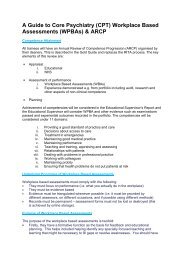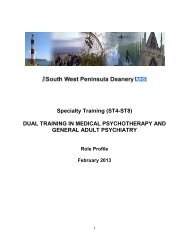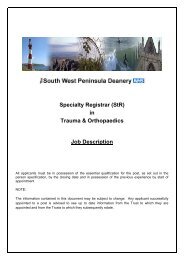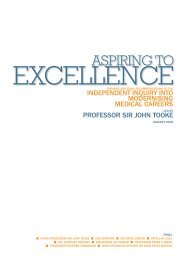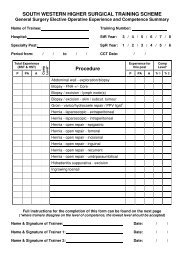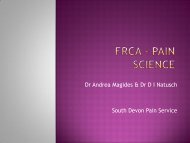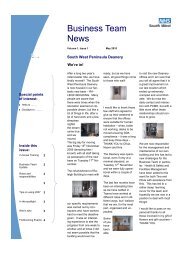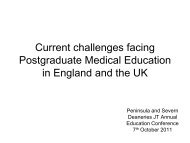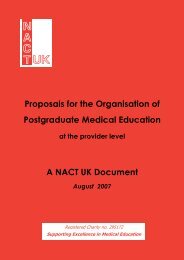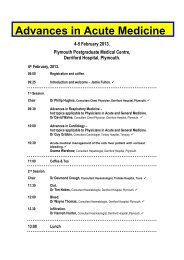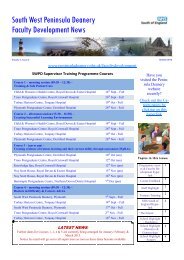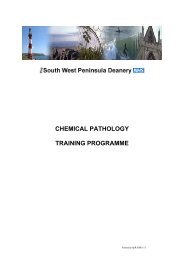Draft - South West Peninsula Deanery
Draft - South West Peninsula Deanery
Draft - South West Peninsula Deanery
Create successful ePaper yourself
Turn your PDF publications into a flip-book with our unique Google optimized e-Paper software.
Academic Clinical Lecturer<br />
Neurology ST3 or above<br />
Role Description<br />
February 2012
Job title<br />
Academic Clinical Lecturer (ACL) in Neurology: recruitment at ST3 level or above.<br />
50% academic/research and 50% clinical<br />
This post attracts an academic national training number (NTN (a)).<br />
1. Purpose of the post<br />
The main purpose of this post is to kick start the career of an academic neurologist.<br />
The successful candidate, who has already achieved a further degree will be given the very<br />
best opportunity to acquire research academic skills on which to build an academic career.<br />
While building these skills, they will be able to complete their clinical training.<br />
2. Duration of post and exit points<br />
The duration of an ACL is for a maximum of 4 years or until CCT is reached, whichever is<br />
sooner.<br />
The 4-year duration of the NIHR Clinical Lectureship may mean that a period of dedicated<br />
clinical training is appropriate prior to application in order to allow completion of specialty<br />
training within the 4-year period.<br />
3. Eligibility for the post<br />
Doctors with neurology experience who are 4 years or less from completion of training and<br />
who have completed a PhD/MD (or equivalent) are eligible to apply.<br />
4. Hospitals in which training will take place<br />
The clinical training will be based in Derriford hospital in Plymouth as this is close to the<br />
research facilities. The <strong>Peninsula</strong> rotation includes Royal Devon and Exeter hospital and<br />
Treliske hospital at Truro and trainees who continue with clinical training would rotate to all<br />
hospitals on the scheme. Details below.<br />
5. Research institutions in which training will take place<br />
The research will be primarily in the <strong>Peninsula</strong> College of Medicine and Dentistry (PCMD) on<br />
the Plymouth site although attachments to other research units or to develop research skills<br />
will be supported.<br />
2
6. Clinical and academic time allocation<br />
The overall proportion of research to clinical time is 50% to 50%. In order to maximise the<br />
research potential of the post, it is anticipated that the protected research time will be in<br />
blocks of several months (exact duration and distribution can be agreed with the academic<br />
supervisor at the start of the research programme). The organisation of this part of the post is<br />
paramount to meeting the stated purpose of the post.<br />
7. Description of the research component<br />
Research training will be with any of the neuroscience research teams at PCMD depending on<br />
the interest and experience of the trainee.<br />
Neuroscience research embraces neurology research, across the whole translational spectrum<br />
from basic science to clinical trials and is funded by MRC, Wellcome and NIHR. The college has<br />
a strong track record in neurological clinical trials, epidemiology and outcome measures<br />
research. Clinical neurobiology research is disease orientated and translational. It looks at<br />
underlying mechanisms focussing on neurodegeneration including motor neurone diseases<br />
and Parkinson’s disease, disorders of myelinating cells, neuronal migration disorder, and brain<br />
tumours. Neuroscience research is one of the major research themes at <strong>Peninsula</strong> medical<br />
School and University of Plymouth, complementing existing strengths such as the Clinical<br />
Trials Unit, Cognitive Neurology, Neurobiology and Neuropathology.<br />
The Clinical Neurology Research Group (CNRG) was established in 2000 with the aim of<br />
improving treatments for people with chronic neurological disease, particularly multiple<br />
sclerosis (MS). The Group is currently coordinating a variety of clinical research projects<br />
relating to neurodegenerative diseases, details of which can be found at<br />
http://sites.pcmd.ac.uk/cnrg/. The overall goal of the Group is to continue making significant<br />
contributions to the knowledge, understanding, and treatment of chronic neurological<br />
conditions by maintaining interests in cutting edge theory and research, and continuing to<br />
apply rigorous research methods to evaluate them.<br />
Clinical Neurobiology research at the medical school is disease-oriented with the overall aim<br />
of working from bench to bedside. Research is focused on specific disease areas;<br />
neurodegeneration especially in MS and motor neuron disease, neuronal migration disorders,<br />
cognitive neuroscience and brain tumours. These diseases represent areas of great medical<br />
need and we perform translational work in each. Our research is further underpinned by<br />
common basic themes. To achieve our goal a variety of paradigms including in vitro models<br />
and other disease models are employed as well as modern techniques of protein biochemistry<br />
and molecular biology to high resolution imaging of live cells. The bench to bedside approach<br />
at PCMD is fundamental to the close collaboration between different institutions across the<br />
<strong>South</strong> <strong>West</strong>.<br />
3
There are currently 4 academic neurologists in post: Professor John Zajicek has a special<br />
interest in neurological inflammatory disorders and has completed several large clinical trials<br />
looking at the effects of cannabinoids in patients with multiple sclerosis. Professor Jeremy<br />
Hobart has interests in neuro-rehabilitation and outcome measures. He has published widely<br />
and is very active in these research areas. Professor C Oliver Hanemann has clinical interests<br />
in neuromuscular disease and neuro-oncology and has research expertise in neuro-oncology<br />
and MND. Dr Camille Carroll is an MRC research Lecturer and honorary Senior Lecturer, with a<br />
research programme into mechanisms of cell death in Parkinson’s disease. All 4 academics<br />
believe strongly in a fully translational approach to research.<br />
Plymouth neuroscience is firmly involved in the new structures for research in the UK with<br />
infrastructure support being available through DeNDRoN as well as the Stroke Research<br />
Network (SRN). Prof Hanemann is DeNDRoN MND Research director for the SW and Dr Carroll<br />
is joint PD Research director. There is also a neuroscience theme within the PenCLAHRC,<br />
which will also facilitate the addressing of relevant clinical research questions. Professor<br />
Zajicek also sits on the NIHR Programme Grant Subpanel for Neuroscience and Mental Health<br />
as well as the MRC Neuroscience and Mental Health Board. Prof Hanemann is member of<br />
DenDRoN and NCRI CSGs<br />
The trainee will be allocated an academic supervisor and a mentor as well as a clinical<br />
educational supervisor.<br />
There are regular research meetings/journal clubs alternating each Wednesday and Friday.<br />
There is a structured PhD program administered by University of Plymouth research degrees<br />
(pcmd-researchdegrees@pcmd.ac.uk). More details are given below.<br />
The exact research component would be tailored to the successful applicant. For this reason,<br />
exact details of this are difficult to supply but to help applicants know what sort of thing might<br />
be included an example is provided below:<br />
A Lecturer’s research component could for example be participation in the monthly neurooncology<br />
clinic with Prof Hanemann. He or she would learn about and be involved in early<br />
phase clinical trials together with Prof Hanemann under the guidance of the <strong>Peninsula</strong> clinical<br />
trials unit. As these trials are a direct translation of the research work at PCMD this would also<br />
enable the Lecturer to do laboratory work such as validating and analysing molecular<br />
biomarkers as part of an established team. Additional training in research skills is described<br />
below. Ideally this research component would be divided in blocks of 4-5 months. The<br />
Lecturer will be actively supported in the writing of publications and funding applications. It is<br />
anticipated that in order to achieve this, the trainee will need to have undertaken some<br />
preliminary studies to obtain pilot data with the help of the research team, and have<br />
developed the writing skills necessary for grant and possibly ethics applications. Initial drafts<br />
will be circulated internally and externally for review and comment. The Lecturer will also<br />
undergo mock interview as preparation for real panel interviews.<br />
4
8. Description of the clinical training<br />
Clinical training during the period of the ACL will take place at Derriford Hospital. This is the<br />
largest acute hospital in the <strong>Peninsula</strong> and is the main site in the <strong>Peninsula</strong> neurology training<br />
rotation.<br />
The department of neurology provides a comprehensive neurological service for the people of<br />
Plymouth and part of East Cornwall, a catchment population of approximately 515,000. The<br />
department has facilities for elective and emergency admissions and the assessment and<br />
rehabilitation of patients with chronic neurological disability. We maintain close links with<br />
Torbay hospital and the 3 neurologists there (Dr R Aylward, Dr I Imam and Dr J Ramtahal) and<br />
also provide an outpatient MS service (Professor J Hobart) and a referral pathway for patients<br />
with complex neurological conditions who need specialist inpatient care.<br />
The Department is staffed by 6 full time clinical neurologists: Dr Martin Sadler (special interest<br />
in epilepsy and training programme director for the <strong>Peninsula</strong> neurology course), Dr Simon<br />
Edwards (interests in movement disorders and dementia and associate clinical director for<br />
neurosciences), Dr Steve Allder (interests in cerebrovascular disease and safer hospital<br />
systems management and assistant medical director of Derriford), Dr Stuart Weatherby<br />
(interests in headache and motor neuron disease) and Dr Azlisham Mohd Nor (interests in<br />
cerebrovascular disease). We have also recently appointed Dr Liz Househam as consultant<br />
neurologist with special interest in muscular diseases to provide a service for patients with<br />
myopathies across the <strong>Peninsula</strong> and to increase our neuromuscular provision. In addition, we<br />
have a consultant rehabilitation doctor, Dr Rachel Bottell, who has involvement with the<br />
stroke service in particular. The academic neurologists are Professor John Zajicek, Professor<br />
Jeremy Hobart, Dr Carroll and Professor C Oliver Hanemann. Their interests are described<br />
above. There are 9 Specialist Registrars in neurology who rotate between Plymouth (6), Truro<br />
(1) and Exeter (2) in the <strong>Peninsula</strong> Training Rotation. There are 7 F2/-CMT2s who spend 4<br />
months in the unit as part of a medical rotation and a trust doctor in stroke.<br />
In addition, there is a research registrar in neurology working with Professor Zajicek.<br />
There are 2 specialist nurses in multiple sclerosis (Amanda Grant & Helen Rutherford), and<br />
specialist nurses in epilepsy (Debbie Coker), Parkinson’s disease (Dawn Hugill),<br />
neurofibromatosis (Helen Tomkins) and neuromuscular disease (Jane Stein).<br />
The Department works closely with the Departments of Neurosurgery, Clinical<br />
Neurophysiology, Neuroradiology, Neuropathology and Neuropsychology and also with<br />
experienced nursing staff and para-medical staff.<br />
5
Specialist clinics<br />
This is a table of consultants and their specialist clinics at which trainees can participate.<br />
Consultant<br />
Interest/specialist clinic<br />
Professor John Zajicek Neuro inflammation/ MS<br />
Professor Jeremy Hobart MS (in Torbay)<br />
Dr Martin Sadler<br />
Epilepsy<br />
Dr Simon Edwards<br />
Parkinson’s and movement disorders<br />
Dr Steve Allder<br />
Cerebrovascular disease<br />
Dr Stuart Weatherby<br />
Headache<br />
Dr Azli Mohd Nor<br />
Cerebrovascular disease<br />
Professor C Oliver Hanemann Neuromuscular disease and neuro-oncology<br />
Dr Liz Househam<br />
Adult dystrophy and neuromuscular disease<br />
Dr Rachel Bottell<br />
Rehabilitation medicine<br />
Dr. Camille Carroll<br />
Parkinson<br />
9. Department of neurosurgery<br />
The <strong>South</strong>-<strong>West</strong> Neurosurgical Unit provides a comprehensive Neurosurgical Service to the<br />
population of Devon, Cornwall, the Isles of Scilly, and part of Somerset. The population of this<br />
area is approximately 2.0 million, but rises considerably during the summer months, with the<br />
influx of visitors from other parts of the U.K. and from abroad. Close links exist with the<br />
District General Hospitals situated in Truro, Barnstaple, Exeter, Torbay, Taunton and Yeovil.<br />
Helicopter air ambulances facilitate rapid transfer of patients between outlying hospitals and<br />
Plymouth.<br />
The department has its own intensive care and high dependency areas. There is some<br />
specialisation within the department: Mr James Palmer - image guided tumour and<br />
stereotactic surgery, lateral skull base surgery ; Mr Lou Pobereskin - transphenoidal surgery,<br />
and lumbar disc surgery; Mr Tim Germon - complex spinal surgery; Professor Peter Whitfield<br />
– tumour and vascular surgery; Miss Anne Moore – anterior and central skull base surgery,<br />
vascular surgery; Mr Paul Fewings – tumour and vascular surgery; Mr Nagarajan Sudhakar –<br />
complex spinal surgery; Mr Nicholas Haden – tumour and complex spinal surgery. Commander<br />
Steven Smith – lumbar spinal surgery. A stereotactic radiosurgery service is provided, in<br />
conjunction with the Clinical Oncology service.<br />
10. Department of neurophysiology<br />
The department lacks a full-time consultant clinical neurophysiologist at present and there are<br />
plans to recruit to this post. The department has all the facilities for modern<br />
neurophysiological investigations including nerve conduction studies, electromyography,<br />
electroencephalography, 24 hour EEG recordings and 24 hour video EEG telemetry (2 suites),<br />
6
visual, auditory and somatosensory evoked potentials, central motor conduction times and<br />
sleep recordings. In addition, research projects are undertaken in conjunction with the<br />
Universities of Plymouth and Sheffield, and this latter research group has produced 2 PhDs.<br />
11. Department of neuroradiology<br />
This department is staffed by 3 full-time neuroradiologists, all of whom are interventional<br />
neuroradiologists. There are facilities for angiography, myelography, CT and MRI scanning and<br />
interventional neuro-radiology. A weekly meeting is held with the department of neurology<br />
for review of neuroradiology.<br />
12. Department of neuropathology<br />
This is staffed by 2 full-time clinical neuropathologists, one of whom (Dr David Hilton) has a<br />
major academic commitment. Monthly neuropathology meetings are held on a Thursday<br />
morning.<br />
13. Neurological rehabilitation<br />
There is a full-time Consultant in Neurological Rehabilitation (Dr Suba Vandabona) and a staff<br />
grade (Dr Thorsten Ruffle-Brandt) in rehabilitation. There is a Stroke Rehabilitation Unit and a<br />
21-bedded neurological rehabilitation unit (Plym) at Mount Gould Hospital.<br />
14. Neuropsychology<br />
There are two consultant neuropsychologists and other members of an expanding<br />
department. A full range of neuropsychological assessment is available.<br />
15. Pain clinic<br />
The Department has close links with the Pain Clinic, which is staffed by 5 Consultant<br />
Anaesthetists, with a complement of 3 beds. A regional trigeminal service is offered by Dr<br />
Mark Taylor. Dr Francis Luscombe provides a comprehensive intrathecal baclofen and<br />
morphine service. Dorsal column stimulators and radiofrequency treatment are also available.<br />
The Neurology Department also has links with the Department of Clinical Genetics which is a<br />
sub-regional service based at the Royal Devon and Exeter Hospital in Exeter<br />
16. Attending inpatient system<br />
We run an attending system for inpatient care. This means that each week, there is a<br />
consultant who has responsibility for inpatient care. Each week runs from Monday through<br />
the weekend and handover is on the following Monday. During this week, there will be a<br />
7
consultant who has his whole time available for inpatient management. Each day begins with<br />
a handover at 8.30, followed by a post take round. There may be further reviews of new or<br />
existing patients depending on their clinical progress. This system has markedly decreased the<br />
inpatient stay for our patients while providing a consultant led management. It is an<br />
opportunity for each StR to hone their patient management skills as they work closely with<br />
the consultant of the week.<br />
17. Training opportunities<br />
The bulk of the 2010 neurology curriculum can be delivered locally in Plymouth. Where this is<br />
not possible, arrangements can be made for a trainee to attend the required courses/clinics<br />
elsewhere. On arrival further information is provided in the induction documents and in<br />
discussion with an educational supervisor. The Lecturer will have an educational supervisor<br />
who will provide support for the clinical aspects of training as well as supervision from other<br />
consultants in the role of clinical supervisors. Regular meetings will be held to ensure that the<br />
individual training needs of the Lecturer are met, and that adequate opportunities are<br />
provided to gain experience in areas of interest.<br />
Regional training days (Calman days)<br />
All StRs are expected to attend the regional training days. Much effort is put into these by the<br />
organising centre. There are feedback forms available on each occasion, with the opportunity<br />
to rate each day so that the programme can develop.<br />
Regular meetings<br />
There are regular academic and business meetings through the week. Examples include a<br />
weekly neuroradiology meeting in which all of the inpatient and selected outpatient scans are<br />
reviewed and discussed with the neuroradiologists. There is a weekly brain tumour MDT<br />
attended by neurologists, neuroadiologists, neurosurgeons and neuro-oncologists from the<br />
peninsula. The academic Neuroscience meeting takes place every Thursday with case<br />
presentations and discussion attended by neurologists from across the peninsula as well as<br />
neuropsychologists, neuro-psychiatrists and others. The programme includes monthly guest<br />
lectures on topics designed to cover the neurology curriculum.<br />
There is also a journal club each month attended by neurologists from all surrounding units.<br />
There are regular research meetings/journal clubs alternating each Wednesday and Friday.<br />
The Lecturer is expected to present at these on a pro rota basis. With external speakers at the<br />
IBCS seminar series we run meet the speaker session for research students on the day during<br />
lunch. There is ample opportunity for in house professional skills training, such as<br />
management, leadership, teaching and professional integrity. More details can be found on:<br />
see http://www.pcmd.ac.uk/postgraduate.php?tab=professional_skills.<br />
Other training opportunities<br />
In order to facilitate training in all areas of the curriculum, or to develop particular interests or<br />
in the case of clinical trainees to perform studies and to write up work, all trainees in<br />
8
Plymouth have periods when they are relieved of normal day-time duties, but continue to<br />
take part in the on-call rota. These periods can either be lumped into 2 month units (usually 2<br />
per year) or spread on a weekly basis depending on trainee and service demands. ACL trainees<br />
would be encouraged to gain additional subspecialty experience at other centres as needed<br />
but would not be required to pursue research projects in addition to the ACL project during<br />
their clinical time. Clinical trainees have further opportunities for regular study, out of area<br />
training or research when they rotate to Exeter or Truro hospitals,<br />
18. Facilities<br />
The StR room has computers and digital video equipment and software for recording<br />
interesting cases. There are good library facilities on site and online journal access.<br />
19. Assessments and appraisal<br />
There will be regular assessment of both the clinical and academic components of the post.<br />
Regular meetings will be held to ensure that all of the Lecturer’s training needs are being met,<br />
and to identify areas which may need more attention to ensure that the fellow achieves his or<br />
her goals. The post holder will have a clinical educational supervisor as well as clinical<br />
supervisors and be assessed in accordance with the 2010 neurology training curriculum. There<br />
will be an annual ARCP. The post holder will also have academic supervisors and progression<br />
will depend upon satisfactory progress both in the academic and clinical parts of the post.<br />
20. On call<br />
At present the rota is a 1 in 6 partial shift with prospective cover. The neurology registrar is<br />
on call in the evening from 5pm to 9pm with overnight cover provided by the resident medical<br />
registrar. This may change depending on the number of StRs. The ACL would be in addition to<br />
these posts making the on call 1:7.<br />
21. Local teaching<br />
The Lecturer’s will be encouraged to obtain training in teaching (details can be found on the<br />
PCMD website above). The StRs are involved in regular teaching of F2-CMT2s and in teaching<br />
courses for GPs. Participation in the Medical School teaching programme will be expected.<br />
22. Other information<br />
Details of the other hospitals in the neurology training programme can be requested and<br />
would be available to candidates who decided to complete clinical training in the rotation. See<br />
3 above.<br />
23. Academic programme director<br />
9
Prof. Dr. C. Oliver Hanemann MD, FRCP<br />
Academic lead department of neurology PHNT<br />
Consultant in Neurology<br />
Chair of Clinical Neurobiology<br />
<strong>Peninsula</strong> College of Medicine and Dentistry<br />
The John Bull Building<br />
Tamar Science Park<br />
Research Way<br />
Plymouth, PL6 8BU<br />
Tel 0172437418 or via email Oliver.Hanemann@pms.ac.uk<br />
24. Clinical training programme director<br />
Dr Martin Sadler BSc, PhD, MBBS, FRCP<br />
Training programme director peninsula neurology<br />
Consultant neurologist<br />
Derriford Hospital<br />
Derriford<br />
Plymouth PL6 8DH<br />
Tel 01752 517668 or email m.sadler@nhs.net<br />
25. <strong>Deanery</strong> contact for further information<br />
Neil Squires<br />
Specialty Training Manager<br />
Tel 01752 676131<br />
Email neil.squires@southwest.nhs.uk<br />
26. For further information about National Institute for Health Research Academic<br />
Clinical Lectureships<br />
http://www.nihrtcc.nhs.uk/intetacatrain/<br />
27. General information<br />
This document forms part of the job description for Specialist Trainees working in the<br />
<strong>Peninsula</strong> <strong>Deanery</strong>.<br />
The Terms and Conditions of Employment (including those related to leave and sick pay) are in<br />
accordance with the nationally agreed Terms and Conditions of Service of Hospital Medical<br />
and Dental Staff (England and Wales) and General Whitley Council Conditions of Service<br />
currently in force and as amended from time to time.<br />
10
Appointments are superannuable unless you opt out of the scheme or are ineligible to join,<br />
and your remuneration will be subject to declaration of superannuable contributions in<br />
accordance with the National Health Services Superannuation Scheme.<br />
28. Hours of Work<br />
Your duty hours will be an average of 48 hours per week (part-time staff pro rata) depending<br />
upon the pattern of work offered by the employer, which should be in accordance with<br />
paragraph 20 of the TCS. This may include work in the evenings, at night and weekends. The<br />
TCS may be viewed at http://www.nhsemployers.org/pay-conditions/pay-conditions-467.cfm<br />
Candidates should be aware that junior doctors’ hours are constantly under review<br />
throughout all hospitals in the <strong>South</strong> <strong>West</strong> <strong>Peninsula</strong>; on call/shift commitments are therefore<br />
subject to change. Banding arrangements may differ as individual Trusts determine rotas at<br />
local level. Candidates should also be aware that on-call is not guaranteed.<br />
29. Salary scale<br />
You should be paid monthly at the rates set out in the national terms and conditions of service<br />
for hospital medical and dental staff and doctors in public health medicine and the community<br />
health service (England and Wales), “the TCS”, as amended from time to time. The payscales<br />
are reviewed annually. Current rates of pay may be viewed at<br />
http://www.nhsemployers.org/pay-conditions/pay-conditions-2339.cfm. Part-time posts will<br />
be paid pro-rata.<br />
30. Pay supplement<br />
Depending upon the working pattern and hours of duty you are contracted to undertake by<br />
the employer you should be paid a monthly additional pay supplement at the rates set out in<br />
paragraph 22 of the TCS. The current payscales may be viewed at<br />
http://www.nhsemployers.org/pay-conditions/pay-conditions-2339.cfm. The pay supplement<br />
is not reckonable for NHS pension purposes. The pay supplement will be determined by the<br />
employer and subject to monitoring.<br />
31. Study Leave<br />
The employer is expected to offer study leave in accordance with paragraphs 250 – 254 of the<br />
TCS. Local policy and procedure will be explained at induction.<br />
32. Assessment of Training<br />
Training appointments are subject to regular local and annual assessment confirming<br />
satisfactory progress through the programme. The requirements of the assessments will be<br />
11
detailed in the “Gold Guide” which may be viewed at<br />
http://www.mmc.nhs.uk/default.aspx?page=457.<br />
33. Disclosure of Criminal Background<br />
This position is exempt from the Rehabilitation of Offenders Act 1974. This means that you<br />
must declare all criminal convictions, including those that you would otherwise be considered<br />
“spent”.<br />
Where the appointment involves substantial access to children and/or vulnerable adults, the<br />
appointment is subject to a police check. The Criminal Records Bureau will be asked to verify<br />
that you have no convictions and cautions or pending prosecutions, convictions, cautions and<br />
bind-over orders. This will include local police force records in addition to checks with the<br />
Police National Computer and the government departments lists held by the Department of<br />
Health for Education and Employment, where appropriate.<br />
Police checks will only be requested for candidates recommended for appointment and will be<br />
carried out by the employing Trust.<br />
34. Medical Clearance<br />
Offers of employment to the rotation will be subject to satisfactory medical clearance<br />
including Hepatitis B status.<br />
Medical checks will only be requested for candidates recommended for appointment and will<br />
be carried out by the employing Trust.<br />
35. Relocation Expenses<br />
The employer will have a local policy for relocation expenses based on paragraphs 314 – 315<br />
of the TCS and national guidance at http://www.nhsemployers.org/pay-conditions/payconditions-467.cfm.<br />
You are advised to check eligibility and confirm any entitlement with the<br />
employer before incurring any expenditure. The current Relocation Expenses guidelines can<br />
be accessed via the <strong>South</strong> <strong>West</strong> <strong>Peninsula</strong> <strong>Deanery</strong> website (www.peninsuladeanery.nhs.uk).<br />
36. Less Than Full Time Working<br />
Less than full time working is available for doctors in the training grades for whom full-time<br />
training is not practical for “well-founded individual reasons”. However the funding for flexible<br />
training is a finite resource and it may be necessary to place applicants in an order of priority.<br />
A copy of the “Less Than Full Time Working” policy can be obtained from the <strong>South</strong> <strong>West</strong><br />
<strong>Peninsula</strong> <strong>Deanery</strong> website (www.peninsuladeanery.nhs.uk). Doctors wishing to work on a<br />
less than full time basis should be aware that they will be expected to “slot share” with<br />
another less than full time trainee.<br />
12



